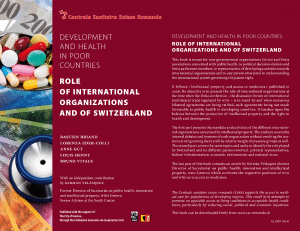“Inevitably, the right to health comes into contradiction with patents on pharmaceutical products, which block the passage of a new medicine to the status of generic medicine.”
“Development and Health In Poor Countries, The Role of International Organizations and of Switzerland,” by Bastien Briand et al. (Centrale Sanitaire Suisse Romande 2010; 224 pp.), presents the mandates and activities of international organizations concerned with intellectual property and underlines the dangers of bilateral ad hoc relations negotiated among countries (or among groups of countries).

The TRIPS Agreement foresees limits to the patenting right. Excluded from patentability are (i) diagnostic, therapeutic and surgical methods for the treatment of persons or animals and as well (ii) plants and animals other than microorganisms (virus, bacteria) and essentially biological processes for plants or animals production (i.e. organisms which are not obtained by genetic engineering) other than non-biological and microbiological processes. According to the European patent Convention (EPC) and the Swiss federal patents law (in Article 2) “essentially biological processes” are not patentable either but the definition of this expression is quite vague. For example the European Patent Office (EPO) granted a patent to a firm from the United Kingdom which was applying for a selection method not involving genetic manipulations and enabling an increase in the content of anticarcinogenic glucosinolate in broccoli plants. The patent includes selection processes as well as the broccoli seeds and edible broccoli plants obtained.
This book asks the essential question of what are the possible consequences of adopting patents for for plant and animal varieties obtained through biotech processes on farmers autonomy and rights? Who is the owner of genetic resources elaborated and selected by indigenous rural communities? How to differentiate knowledge acquired in a laboratory from public knowledge (traditional, local, regional)? How to make the difference between a traditional use (for example the empirical use of certain plants with a presumed therapeutic effect) often without a scientific basis and a knowledge based on rigorous research work?
It is therefore a reasonable question as to how to guarantee a application of WTO law, in a manner consistent with WTO members’ human rights obligation in health. The major tenets of these arguments are that there is the existence of a legal right to access to medicine, although not explicitly mentioned in any agreement. Further, that the adoption of patent legislation under TRIPS leads to higher drug prices, rendering certain drugs unavailable to portions of the population. And finally, that this price effect can infringe the right of access to medicine, even though the prices are set by private individuals.
This has become a major issue as developing countries try to use of international law to gain access to life saving medicines in light of the price of AIDS medicine, as well as medicines for bird flu and for anthrax. This is certainly a topic worthy of further discussion.
“Development and Health In Poor Countries, The Role of International Organizations and of Switzerland,”can be ordered from info(at)css-romande.ch. It is also available as a free download (PDF) at http://www.css-romande.ch

[…] Book review Monday: Development and Health in Poor Countries (Patent Baristas) […]